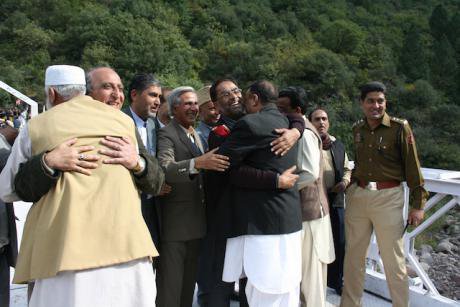
Political leaders and traders from either side of the Line of Control in Kashmir meet for the first time on the Chakothi Bridge after 60 years of separation, as trading across the Line of Control is established. Muhammad Arif Urfi. All rights reserved.Amidst heightened global insecurity and media criticism of foreign aid spending, one might assume a rise in public sympathy for military solutions to armed conflict. However, a new poll shows there is surprisingly strong public appetite to invest in long-term peacebuilding efforts.
During the UK general election campaign this year, the press reported a split in the Cabinet between defenders of the 0.7% foreign aid budget and those who favoured a cut and redirection to a combined defence and security budget. The purpose of this would be to shore up security in countries which are incubators for terrorism.
But cutting foreign aid to free up money to ‘keep Britain safe’ is a false dichotomy. Spending more on defence and security in countries where chronic political and governance problems are fuelling conflict and providing fertile ground for radical groups will not resolve those issues or necessarily make Britain safer. Whereas, international aid, when it works with people to address the factors fuelling conflict, can do.
Peacebuilding is often an invisible sub-sector of international development. There is no one definition of the term, but it is considered by the United Nations and those that work in the field as a process which goes beyond ending violence to establish the conditions for durable peace and prevent the recurrence of violence. For most practitioners, peacebuilding should be owned by people living with conflict, based on an analysis of conflict and peace, and involve strategic interventions to address underlying causes or drivers of conflict.
Until now it has been unclear what the UK public knows and thinks about peacebuilding. However, the results of three national surveys published today by NGO Conciliation Resources and the US-based Alliance for Peacebuilding, to coincide with International Day of Peace on 21 September, shed new light on public attitudes here, in the US and in Germany. The results are striking, and useful.
In the UK, 71 per cent of respondents agreed that ‘peacebuilding plays a vital role in ending violent conflicts’ and 60 per cent stated that the UK should be investing more resources in it. Compare this to the results of surveys that assess levels of support for an increased overseas aid budget – around 15 per cent in 2016 according to one monitor. While the two questions are not directly comparable, the discrepancy in responses suggests that raising public awareness of peacebuilding as an aspect of overseas aid, and raising it as a UK aid priority, would tap into existing public support.
Asked why they think their governments should get involved in peacebuilding, the most popular justifications related to human rights, with a striking 84 per cent of people in the UK, US and Germany favouring the argument that ‘human beings have the right to live in peace: free from conflict’. This shared respect for basic human rights is heartening at a time of increased polarisation in society.
But what do the public understand by ‘peacebuilding’? The three most popular choices selected by people in the UK and the US from a range of descriptions, reflect what people working within this sector would consider to be the key principles and values of peacebuilding. Most people see peacebuilding as ‘the long-term process of rebuilding relationships, changing attitudes and establishing fairer institutions’. It is telling that in Northern Ireland, where people well understand the trauma and long-term consequences of violent conflict, 79 per cent of people chose this statement compared to 68 per cent in the UK as a whole.
Other popular descriptions showed an understanding of peacebuilding as an inclusive endeavour involving ‘everyone from communities to governments working to end fighting and prevent the recurrence of violence’, and as addressing ‘the underlying drivers, not the symptoms of conflict.’ Rather than interpreting peacebuilding as high-level deals and top-down solutions, the results show public appreciation of the long-term and inclusive nature of the work.
So why do these opinions matter? Firstly, because there is a clear need for sustained investment by a wide range of people, governments, and international institutions in efforts to reduce violent conflict and build peace. Half the world’s poor live in countries affected by conflict, fragility and violence. Conflicts drive 80 per cent of humanitarian needs and reduce gross domestic product by on average two percentage points per year. Today’s famines in Yemen, South Sudan, Somalia and north-eastern Nigeria, affecting millions of people, are a result of violent conflict fuelled by a complex system of factors.
Knowing what the public understand peacebuilding to be, and how strongly they feel about it, is essential information to feed into efforts to shift the emphasis from military solutions to long-term work to tackle the root causes of conflict and to prevent it from happening.
Conflicts fuel world military spending – estimated at $1.69 trillion in 2016. These are resources that could and should go to addressing poverty and humanitarian needs. By contrast investment in peace-keeping and peacebuilding is fractional. More to the point, peacebuilding works. As a report by International Alert published today shows, there are countless examples of how peacebuilding and conflict prevention efforts are effective in addressing causes of conflict in areas such as governance, security, livelihoods and justice.
Finally, public opinion also has a bearing on the scope for one of the most sensitive but necessary areas of peacebuilding: activity aimed at encouraging armed groups to abandon violence and engage in a peace process. Contrary to expectations, the survey results revealed high levels of support for institutions like the UN, as well as governments, ‘talking to’ or ‘mediating between’ armed groups in pursuit of peace. Presented with examples like Northern Ireland and Colombia, 75 per cent of UK respondents even said the UN should be able to ‘negotiate with’ proscribed terrorist organisations (69 per cent for governments). Furthermore, most people would feel ‘hopeful’ if they knew that the UK Government had played a key role in negotiating peace between or with armed groups in the world.
At a time of proliferating conflicts that generate a sense of global insecurity and fear, these are hopeful findings. They should give decision-makers greater confidence in defending and prioritising the investment of resources in peacebuilding, and in communicating this to the public. Our mutual security and prosperity depends on it.
A conflict analysis workshop, in the Central African Republic to analyse and understand the root causes of the conflict, to offer practical tools in inter-community dialogue and create peace messages. Conciliation Resources. All rights reserved.
Read more
Get our weekly email



Comments
We encourage anyone to comment, please consult the oD commenting guidelines if you have any questions.